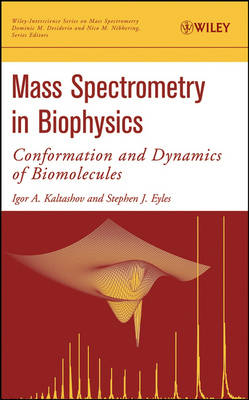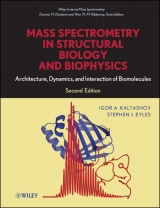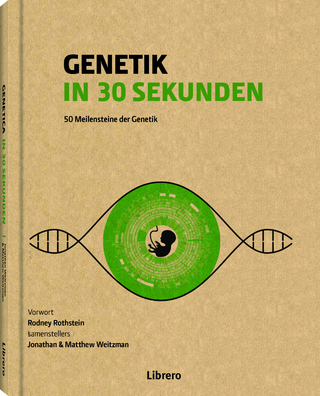
Mass Spectrometry in Biophysics
John Wiley & Sons Inc (Verlag)
978-0-471-45602-5 (ISBN)
- Titel erscheint in neuer Auflage
- Artikel merken
This title presents the first systematic summary of biophysical mass spectrometry techniques. Recent advances in mass spectrometry (MS) have pushed the frontiers of analytical chemistry into the biophysical laboratory. As a result, the biophysical community's acceptance of MS-based methods, used to study protein higher-order structure and dynamics, has accelerated the expansion of biophysical MS. Despite this growing trend, until now no single text has presented the full array of MS-based experimental techniques and strategies for biophysics. "Mass Spectrometry in Biophysics" expertly closes this gap in the literature. Covering the theoretical background and technical aspects of each method, this much-needed reference offers an unparalleled overview of the current state of biophysical MS."Mass Spectrometry in Biophysics" begins with a helpful discussion of general biophysical concepts and MS-related techniques.
In this title, subsequent chapters address: modern spectrometric hardware; high-order structure and dynamics as probed by various MS-based methods; techniques used to study structure and behavior of non-native protein states that become populated under denaturing conditions; kinetic aspects of protein folding and enzyme catalysis MS-based methods used to extract quantitative information on protein-ligand interactions; relation of MS-based techniques to other experimental tools; and, biomolecular properties in the gas phase. Fully referenced and containing a helpful appendix on the physics of electrospray mass spectrometry, "Mass Spectrometry in Biophysics" also offers a compelling look at the current challenges facing biomolecular MS and the potential applications that will likely shape its future.
IGOR A. KALTASHOV, PhD, is currently an Assistant Professor in the Department of Chemistry at the University of Massachusetts, Amherst. STEPHEN J. EYLES, PhD, is a Lecturer in the Department of Polymer Science and Engineering and the Director of Mass Spectrometry and Molecular Weight Characterization Facility at the University of Massachusetts, Amherst.
Preface. 1 General Overview of Basic Concepts in Molecular Biophysics. 1.1. Covalent Structure of Biopolymers. 1.2. Noncovalent Interactions and Higher-order Structure. 1.3. The Protein Folding Problem. 1.4. Protein Energy Landscapes and the Folding Problem. 1.5. Protein Dynamics and Function. References. 2 Overview of "Traditional" Experimental Arsenal to Study Biomolecular Structure and Dynamics. 2.1. X-Ray Crystallography. 2.2. Solution Scattering Techniques. 2.3. NMR Spectroscopy. 2.4. Other Spectroscopic Techniques. 2.5. Other Biophysical Methods to Study Macromolecular Interactions and Dynamics. References. 3 Overview of Biological Mass Spectrometry. 3.1. Basic Principles of Mass Spectrometry. 3.2. Methods of Producing Biomolecular Ions. 3.3. Mass Analysis. 3.4. Tandem Mass Spectrometry. 3.5. Brief Overview of Common Mass Analyzers. References. 4 Mass Spectrometry-Based Approaches to Study Biomolecular Higher-Order Structure. 4.1. Biomolecular Topography: Contact and Proximity Maps via Chemical Cross-Linking. 4.2. Mapping Solvent-Exposed Regions: Footprinting Methods. 4.3. Emerging Low-Resolution Methods: Zero-Interference Approaches. References. 5 Mass Spectrometry-based Approaches to Study Biomolecular Dynamics: Equilibrium Intermediates. 5.1. Monitoring Equilibrium Intermediates: Protein Ion Charge State Distributions (ESI MS). 5.2. Chemical Labeling and Trapping Equilibrium States in Unfolding Experiments. 5.3. Structure and Dynamics of Intermediate Equilibrium States: Use of Hydrogen Exchange. 5.4. Measurements of Local Patterns of Hydrogen Exchange. References. 6 Kinetic Studies by Mass Spectrometry. 6.1. Kinetics of Protein Folding. 6.2. Kinetics by Mass Spectrometry. 6.3. Kinetics of Enzyme Catalysis. References. 7 Protein Interaction: A Closer Look at the "Structure-Dynamics-Function" Triad. 7.1. Protein-Ligand Interactions: Characterization of Noncovalent Complexes Using Direct ESI MS Measurements. 7.2. Indirect Characterization of Noncovalent Interactions: Measurements Under Native Conditions. 7.3. Indirect Characterization of Noncovalent Interactions: Exploiting Protein Dynamics Under Denaturing Conditions. 7.4. Understanding Protein Action: Mechanistic Insights from the Analysis of Structure and Dynamics Under Native Conditions. 7.5. Understanding Protein Action: Mechanistic Insights from the Analysis of Structure and Dynamics Under Denaturing Conditions. References. 8 Synergism Between Biophysical Techniques. 8.1. Hen Egg White Lysozyme. 8.2. Molecular Chaperones. References. 9 Other Biopolymers and Synthetic Polymers of Biological Interest. 9.1. DNA. 9.2. RNA. 9.3. Oligosaccharides. 9.4. "Passive" Polymers of Biotic and Abiotic Origin. References. 10 Biomolecular Ions in a Solvent-Free Environment. 10.1. General Considerations: Role of Solvent in Maintaining Biomolecular Structure and Modulating its Dynamics. 10.2. Experimental Methods to Study Biomolecular Structure in Vacuo. 10.3. Protein and Peptide Ion Behavior in a Solvent-Free Environment. 10.4. Protein Hydration in the Gas Phase: Bridging "Micro" and "Macro". References. 11 Mass Spectrometry on the March: Where Next? From Molecular Biophysics to Structural Biology, Perspectives and Challenges. 11.1. Assembly and Function of Large Macromolecular Complexes: From Oligomers to Subcellular Structures to ... Organisms? 11.2. Structure and Dynamics of Membrane Proteins. 11.3. Macromolecular Trafficking and Cellular Signaling. 11.4. In Vivo versus in Vitro Behavior of Biopolymers. References. Appendix: Physics of Electrospray. Index.
| Erscheint lt. Verlag | 20.5.2005 |
|---|---|
| Reihe/Serie | Wiley-Interscience Series on Mass Spectrometry |
| Zusatzinfo | Illustrations |
| Verlagsort | New York |
| Sprache | englisch |
| Maße | 161 x 240 mm |
| Gewicht | 764 g |
| Themenwelt | Naturwissenschaften ► Biologie ► Genetik / Molekularbiologie |
| Naturwissenschaften ► Physik / Astronomie ► Angewandte Physik | |
| ISBN-10 | 0-471-45602-0 / 0471456020 |
| ISBN-13 | 978-0-471-45602-5 / 9780471456025 |
| Zustand | Neuware |
| Haben Sie eine Frage zum Produkt? |
aus dem Bereich



